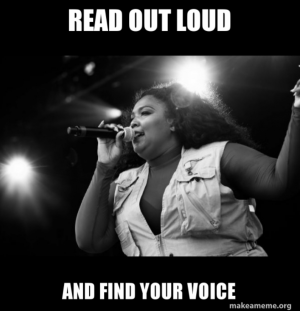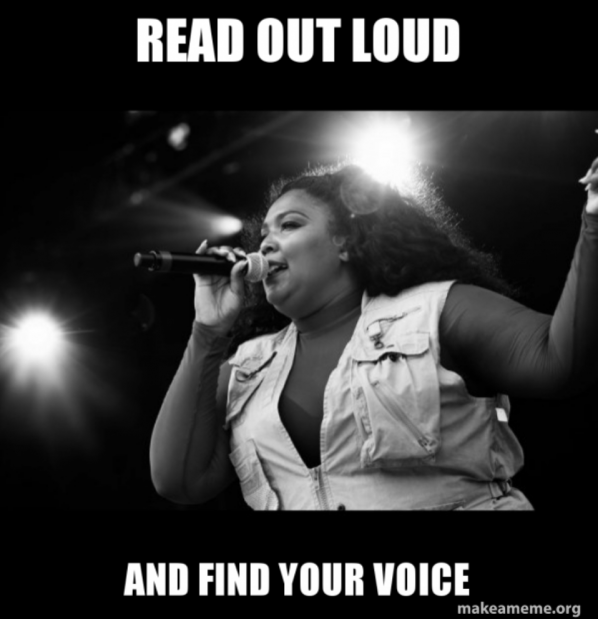by C. Townsend
Let’s talk about reading your writing out loud. Here in the writing center, reading out loud is standard practice. It is also standard in my writing classroom. And let me tell you, my students always flip out when they first learn that this is required. You’d think I’d told them their final presentations had to be modern dance routines. So why do writing centers and composition classrooms insist on making students read their writing out loud? Allow me to take a stab at this.
The most palatable explanation I can offer is proofreading efficiency. If you read your writing out loud, you will catch considerably more sentence-level errors than you would otherwise. We can hear grammatical errors easier than we can see them; that’s just how our brains work. I usually pitch this explanation with little resistance. However, though catching grammar fumbles is great, it isn’t the real prize, in my opinion. Reading out loud is really about hearing your writing voice, getting to know it, and learning to control it.
Have you ever, when trying to apologize for what you perceive as your writing weaknesses, rattled off something like “I write like I talk. That’s my problem?” I have heard this forlorn phrase repeatedly from apprehensive writers. It always feels so weary, like you’ve explained a million times that everyone else was at school for the lesson on how not to write like you talk, while you were getting your braces taken off that day. While I understand the impetus behind the idea, I’ve ultimately come to distrust that the notion is truly a real thing.
Writing like you speak implies that your writing voice and your speaking voice come from the same place in your head. I don’t think they do. When you sit down to write a thank you note to Grandma, you don’t have to imagine a conversation with her in your head and hit an imaginary record button to capture it so that you know what to write in the card. The words and the sentences flow from your brain to your pen directly without having to detour through an imagined talking scenario. As that’s the case, it makes sense that we should become as familiar with our writing voices as our speaking voices.
My verbal expression is sarcastic with a dry, flat delivery style. If you don’t know me, I can come off as curt, which sometimes people interpret as disrespectful. Since I’ve been listening to my verbal expression for a long time now, I’ve gotten to know it; thus, I’ve learned how to adjust it. So I do my best to be aware of my natural tendency toward sarcasm and take steps not to sabotage myself.
My writing voice is different. It tends to be thick and over-explanatory, so it takes me a long time to make a point. And if my intent is to be funny, I take way too long to get to the punchline. This is the opposite of my speaking voice. But I had no clue that this was the case until relatively late in life, when I started reading my writing out loud. When you get into the habit of reading your writing out loud, you become accustomed to what your writing voice sounds like—just like with your speaking voice. And with awareness comes control. But you have to get over the initial uncomfortableness that comes with hearing your writing out loud. Don’t worry too much about that. The jitters pass almost instantly.

